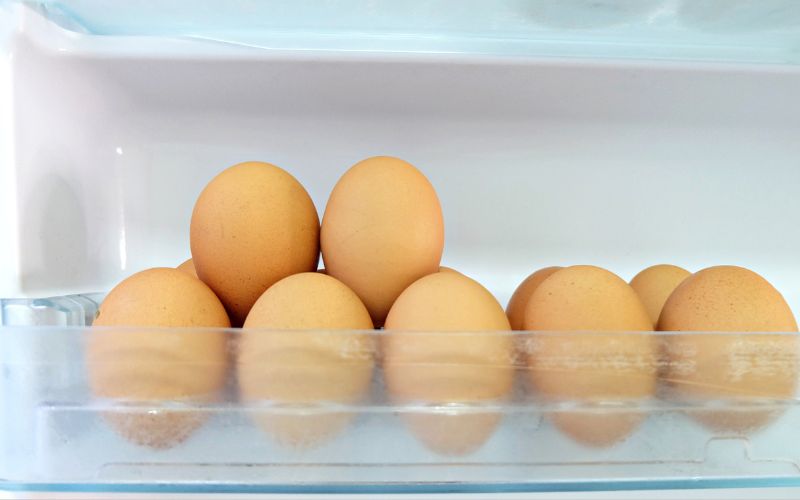Can You Put Room Temperature Eggs Back In The Fridge?
Last updated on October 26th, 2022 at 05:20 pm
All perishable foods have an extended shelf-life when refrigerated than being stored at room temperature or on the counter.
Decay is an eventual process in eggs but can be delayed for a couple more days when refrigerated.
As a baker or homeowner, you could be wondering what the best way to store your eggs is and might have been wondering if it is safe to put room-temperature Eggs back in the fridge or not.
Leaving room-temperature eggs out on the counter is not always safe but is dependent on the source where You got your eggs. While industrially processed eggs have their outer cuticle removed and washed with hot water before being sold to grocery stores and are not allowed to last for over 2 hours, fresh farm eggs can stay on the counter.
Why It’s Not Safe to Leave Eggs on the Counter?

All fresh farm eggs are prone to salmonella contamination from an infected hand or dirt and fecal matter.
In addition, once room temperature eggs have been put in the fridge, they shouldn’t be allowed to sit on the kitchen counter unrefrigerated for more than 2 hours.
This could cause condensation on the eggshells.
Naturally, moisture and warm temperatures are suitable grounds for the growth of salmonella bacterias.
This means that moisture on the eggshells causes the egg to become prone to contamination.
Nevertheless, even without water condensation, room temperature Eggs can still be contaminated with the salmonella bacteria through their light shell.
When left in the refrigerator, eggs could last at least five weeks. The ideal temperature for a refrigerated egg is 40°F.
Hence eggs should not be stored by the refrigerator door since opening the door repeatedly can cause the eggs to drop in temperature lower than the ideal temperature for its refrigeration.
Instead, they are to be kept on the refrigerator shelves, which is the best place to keep them.
It would help if you did not take salmonella contamination casually; therefore, no matter how safe you think your fresh farm eggs are on the counter, it is best to always choose safety by refrigerating them.
Pros and Cons of Putting Room Temperature Eggs in The Fridge.
Most Americans store eggs in the refrigerator as a law, while Europeans believe it’s unnecessary.
American law considers leaving eggs at room temperature on the counter unsafe. Still, there is a way to reduce the rate of bacterial contamination.
While salmonella is safe inside the intestine of warm-blooded animals, its existence in the food supply could be fatal.
In addition, salmonella contamination can cause diarrhea and vomiting in children, adults, and people with underlying illnesses.
To avoid all these issues, eggs are stored at 40°F and boiled at 160° to inhibit or halt the growth of salmonella.
In the United States, for example, before eggs are sold, they are washed with hot soapy water and sprayed with disinfectant through sterilization.
However, this method is limited because it is only effective in killing eggshell bacteria.
Few other countries, including Australia and Japan, treat their eggs using the sterilization process.
The sterilization process is only limited to killing the bacteria on the cuticle of the eggs without affecting the ones that may be inside the egg.
Once the cuticle is removed, the contents of an egg are more likely to be contaminated at any slight contact with a bacteria.
While refrigeration does not eliminate all the bacteria on an egg, it helps limit the activities of bacteria, reduces the risks of falling sick, and stops bacteria from penetrating the eggshells.
Once an egg has been refrigerated, it is compulsory to keep it that way, except for baking processes that require you to allow your eggs to drop back to room temperature before you use them.
On the other hand, European countries vaccinate hens right from the farm to reduce the chances of salmonella bacteria.
While washing and disinfecting Eggs is illegal for countries under the European Union, the United States approved this.
Hence it is fine to let Eggs hang out on the counter or in cool but not refrigerated temperatures when you live in the European States.
Refrigeration may not kill bacteria, but it reduces the risk of bacterial contamination and inhibits its growth on eggshells.
This means that refrigeration of Eggs is dependent on the location most times, so you can try checking what your local food and drug administration says about refrigerating Eggs if you are unsure of the best way to refrigerate your Eggs.
There are a lot of benefits that come with refrigerating Eggs. They include:
- Refrigeration enhances the shelf life of an Egg by extending its shelf life. In other words, it doubles the shelf life of an Egg. This reduces the activities of bacteria and keeps Eggs fresher than when left at room temperature. The quality of room temperature Eggs or fresh farm Eggs will decline after a few days and should be used within 1 to 3 weeks. However, refrigerated Eggs often maintain their quality and freshness at least double the duration, which is 4 – 5 weeks.
Despite the benefits of refrigeration of Eggs, some inconveniences are usually encountered from refrigerating Eggs.
- Eggs absorb the flavors of foods in the fridge, such as garlic, onions, and cheese. To control this, you should always store Eggs in cartons and seal foods in air-tight containers. You can also remove unnecessary strong-flavored food from the refrigerator.
- You should never store eggs in the fridge door because this usually results in temperature fluctuations as you open the fridge door from time to time. This can also create a suitable condition for bacteria to thrive and destroy the protective bloom or cuticle. Always keep your Eggs on the refrigerator shelf.
- Cold Eggs are not suitable for baking as most bakers have suggested. Chefs claim room-temperature Eggs and freshly laid eggs are the best for baking. As a baker, refrigerated Eggs should be allowed to warm up to room temperature before using them. This could take at least two hours before the Eggs condense and drop back to room temperature.
If you decide to stick with sanitized graded Eggs regardless of where you live, you would need to refrigerate your eggs all the time.
Fortunately, this is an easy method to handle and does not need a long process.
However, if you choose to let your Eggs stay on the kitchen counter, you must be extremely cautious of dirt and chicken feces.
The chicken feces could get irritating but resisting the urge to wash them off is the best way to keep you safe and the Eggs from getting contaminated.
Both methods of storing eggs are great and aim to extend the shelf life, but there is a higher risk of bacterial contamination when you leave your Eggs on the counter at room temperature.
Final Thoughts
Whether or not you choose to refrigerate eggs is dependent on your location. However, in the United States, eggs are refrigerated as a law.
In Europe and other countries, it is perfectly okay to keep eggs at room temperature for weeks, especially fresh farm eggs. Nevertheless, refrigeration is the best way to store eggs.







